Do you often find yourself standing in front of the fruit section, wondering what exactly do blackberries taste like? If so, you’re not alone.
From professional chefs to amateur cooks alike, many of us are equally perplexed by the mysterious flavor and texture of this popular berry.
But don’t worry, we’re here to help!
In this blog post, I will walk you through a comprehensive guide on what blackberries taste like – along with my top tips for incorporating them into your favorite dishes. Let’s get started!
What are Blackberries?
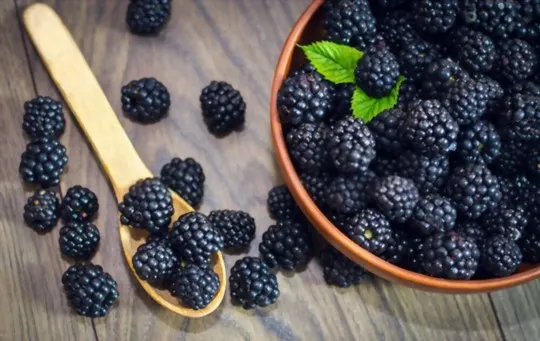
Blackberries are a delicious and nutritious fruit that has been cultivated for thousands of years.
They are a type of aggregate fruit, composed of many individual droplets or drupelets, each with a seed inside.
Blackberries have a complex flavor profile that is simultaneously sweet, tart, and slightly tangy.
Their taste is often described as a mix of flavors, including juicy sweetness, sourness, and bitterness.
The flavor of blackberries varies depending on factors such as ripeness, weather, the variety of the fruit, and cultivation practices.
Blackberries are a great source of antioxidants, fiber, vitamin C, and vitamin K.
They are low in calories and high in nutrients, making them a healthy addition to any diet.
When buying blackberries, choose fruit that is plump, shiny, and firmly attached to the stem.
Ripe blackberries should be dark purple or black and have a sweet aroma.
What Do Blackberries Taste Like?
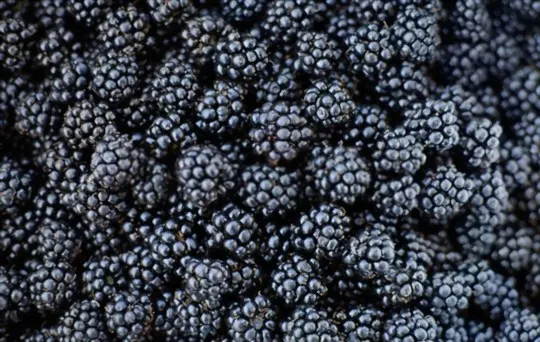
Blackberries are a type of fruit that belongs to the rose family.
They are known for their dark color, sweet and tart taste, juicy texture, and nutritional benefits.
The flavor of blackberries can be described as a mix of sweetness and sourness, which gives it a unique taste.
When fully ripe, blackberries are slightly soft to the touch and have a deep, rich color.
The flavor of blackberries can vary slightly depending on the variety; some are sweeter, while others are more tart.
They can be eaten raw or used in a variety of recipes, including jams, jellies, pies, and muffins.
Blackberries complement both sweet and savory flavors and are a good source of vitamin C, fiber, and antioxidants.
Pro Tip: When buying blackberries, look for plump, firm, and fully ripe ones for the best taste and nutritional benefits.
Factors That Affect the Taste of Blackberries
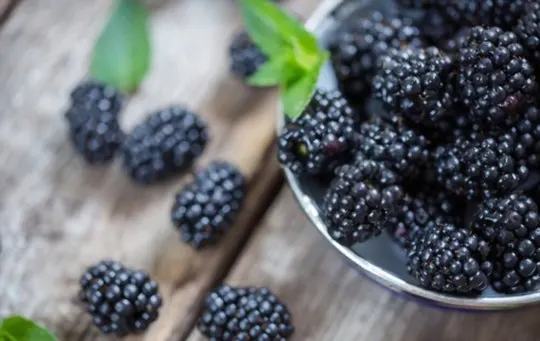
Blackberries are a soft and juicy fruit that belongs to the rose family.
The taste of blackberries can vary depending on several factors.
Here are some factors that can affect the taste of blackberries:
- Ripeness: Blackberries that are fully ripe have a sweet and juicy taste, whereas unripe blackberries can taste sour and tangy.
- Growing conditions: The taste of blackberries can also be influenced by the growing conditions such as soil type, climate, and amount of sunlight the plant receives.
- Variety: Different varieties of blackberries have different flavor profiles. For instance, the Marion variety is known for its sweet, rich, and earthy flavor, while the Ouachita variety has a sweeter taste and a firm texture.
- Storage: Proper storage of blackberries is crucial to maintaining their taste. They should be stored in a cool and dry place, and consumed within a few days after being picked.
In general, blackberries have a sweet and slightly tart taste with a juicy texture.
They are great for snacking on their own or as an ingredient in pies, jams, and other desserts.
To bring out the sweetness of blackberries, sprinkle them with a pinch of sugar before eating or using them in recipes.
1 – Ripeness
Blackberries are a type of fruit that grows on thorny bushes that are native to North America and Europe.
They are known for their deep, almost black color, and their juicy and tart flavor.
When it comes to ripeness, blackberries go through several stages of development.
Unripe blackberries are green, firm, and sour, while ripe ones are deep purple or black, plump, and juicy.
Over-ripe blackberries are squishy and moldy.
To determine whether blackberries are ripe, gently press them with your fingers.
If they feel soft and juice oozes out, they are likely ripe.
Blackberries don’t ripen after being harvested, so it’s essential to pick ones that are ready to eat.
When it comes to flavor, blackberries have a tart and sweet taste, with a slight bitterness that varies depending on the variety.
The sweetness of blackberries can range from mild to very sweet, and their flavor can be described as fruity, floral, or earthy depending on the variety.
Always look for blackberries that are dark, plump, and firm.
They have the best flavor and are full of nutritional benefits.
2 – Growing Conditions
Blackberries are a delicious and nutritious fruit that have a distinct sweet and tart flavor.
Knowing the right growing conditions can help you grow the best blackberries.
Blackberry plants thrive in well-drained soil with a pH between 5.5 and 7.0.
They need full sunlight exposure and at least 1 inch of water per week to produce a good harvest.
Blackberry plants are climbers and require trellising or support for maximum fruit production.
Ripe blackberries have a juicy texture and a combination of sweetness and tartness.
The flavor is often described as a mix of raspberry and grape.
When selecting blackberries, look for ones that are plump, shiny, and deep black in color.
The darker the color, the riper and sweeter the fruit will be.
To ensure a good harvest, prune your blackberry plants in the late winter or early spring to remove any old or dead canes.
This will promote new growth and increase fruit production.
3 – Varieties of Blackberries
Blackberries are a perennial fruit known for their distinct flavor, juicy texture, and nutritional properties.
Here are some of the most popular blackberry varieties and their unique characteristics:
- Triple Crown: This variety is known for its large and firm berries, sweet and tart flavor, and resistance to pests and diseases.
- Marion: Marion blackberries are a type of trailing blackberry with a deep maroon color and a rich, earthy flavor.
- Ouachita: This thornless variety produces large and juicy berries with a sweet and slightly tart flavor. It also has good disease resistance and is perfect for home gardeners.
- Chester: Chester blackberries are a trailing variety with long and cylindrical-shaped berries that have a deep, dark color and a sweet flavor.
- Navaho: Navaho blackberries are thornless and produce large and firm berries with a tart and tangy flavor. They also have a long growing season and excellent disease resistance.
Pro Tip: To get the most out of your blackberry bushes, plant multiple varieties to extend the harvest season and have a range of flavors and textures to enjoy.
Culinary Uses of Blackberries
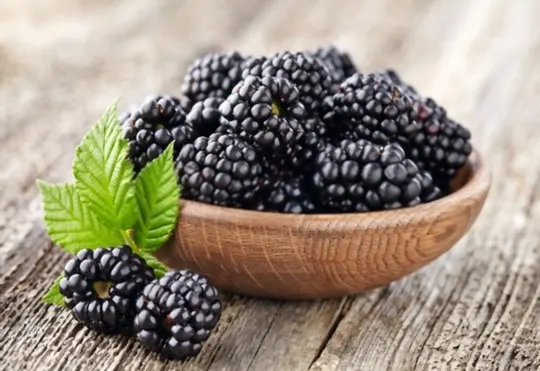
Blackberries are a versatile and delicious fruit that can be used in a variety of culinary applications.
From sweet desserts to savory dishes, here are some ways you can use blackberries in your cooking:
- Desserts: Blackberries make great additions to pies, crumbles, cobblers, and tarts. They can also be used as a topping for ice cream, cakes, and other sweets.
- Beverages: Blackberries can be used to make refreshing summer drinks like lemonade, tea, and cocktails. They can also be blended with yogurt and milk for a healthy smoothie.
- Sauces: Blackberries can add a sweet and tangy flavor to sauces for meat dishes like chicken, pork, or beef. They can also be used in salad dressings or as a dipping sauce for appetizers.
- Jams and preserves: Blackberries make delicious jams and preserves, which can be used on toast, crackers, or even as a marinade for meats.
Overall, blackberries have a sweet and tart flavor, with a slightly bitter aftertaste.
Their taste can vary depending on the variety and level of ripeness.
How to Select and Store Blackberries?
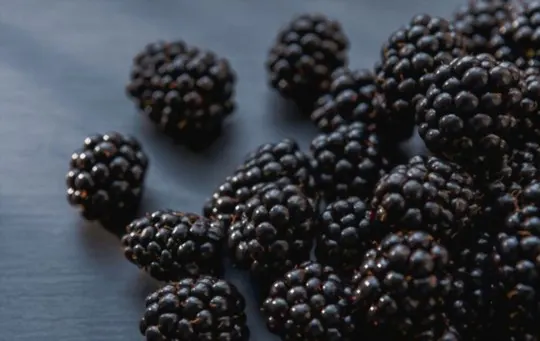
Blackberries are a type of fruit with a distinctive sweet and tart flavor, often used in various culinary applications.
These fruits are grown on thorny shrubs with dark, glossy leaves and small white flowers.
When ripe, blackberries are dark in color, plump, and juicy, with a slightly sweet and tangy taste.
If you’re planning to purchase blackberries or have just picked some in your garden, it’s essential to store them correctly to preserve their quality for more extended periods.
Here are some tips for selecting and storing blackberries:
- Look for plump, uniform blackberries that are free of mold or bruises.
- Store blackberries in a single layer in a shallow container in the fridge, covered with plastic wrap or a lid.
- Use blackberries within a few days of purchase or picking for the best flavor and texture.
- Rinse blackberries gently under cold water just before consuming, removing any debris or dirt; pat them dry gently with a paper towel.
Freeze extra ripe blackberries to enjoy throughout the year in smoothies, jams, or baked goods.
Conclusion
In conclusion, blackberries are a type of sweet, juicy berry that grows on thorny bushes and are most commonly found in North America and Europe.
They have a distinct taste that is a combination of sweet and tart, and their flavor profile has been compared to that of raspberries and blueberries.
While blackberries can be enjoyed raw, they are a versatile fruit that can be used in baking, jams, and other culinary creations.
Additionally, blackberries are packed with nutrients such as vitamin C, antioxidants, and fiber, which make them a healthy addition to any diet.
Overall, blackberries are a tasty and nutritious fruit that offer a dynamic flavor to any dish or snack.
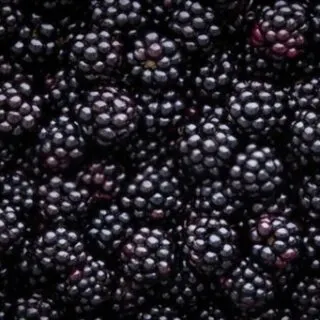
What Do Blackberries Taste Like? A Comprehensive Guide
Ingredients
- Blackberries
- Ingredients from your selected recipes
Instructions
- Select ingredients that work well together.
- Use a recipe or method that will enhance their natural taste.
- Taste and adjust the recipe as needed to achieve the desired flavor.

Carrie is a food writer and editor with more than 15 years of experience. She has worked for some of the biggest names in the food industry, including Bon Appétit, Food & Wine, and Martha Stewart Living.
As the Editor in Chief of IntroChicago.com, Carrie oversees all of the content on the site. She also manages the team of contributing writers and editors, who help to create delicious recipes, helpful tips, and informative articles that you’ll find on the site.
A native of the Chicago area, Carrie is passionate about all things food. She loves trying new restaurants and experimenting with new recipes in her kitchen. She’s also a graduate of the Culinary Institute of America, so she knows a thing or two about food!
